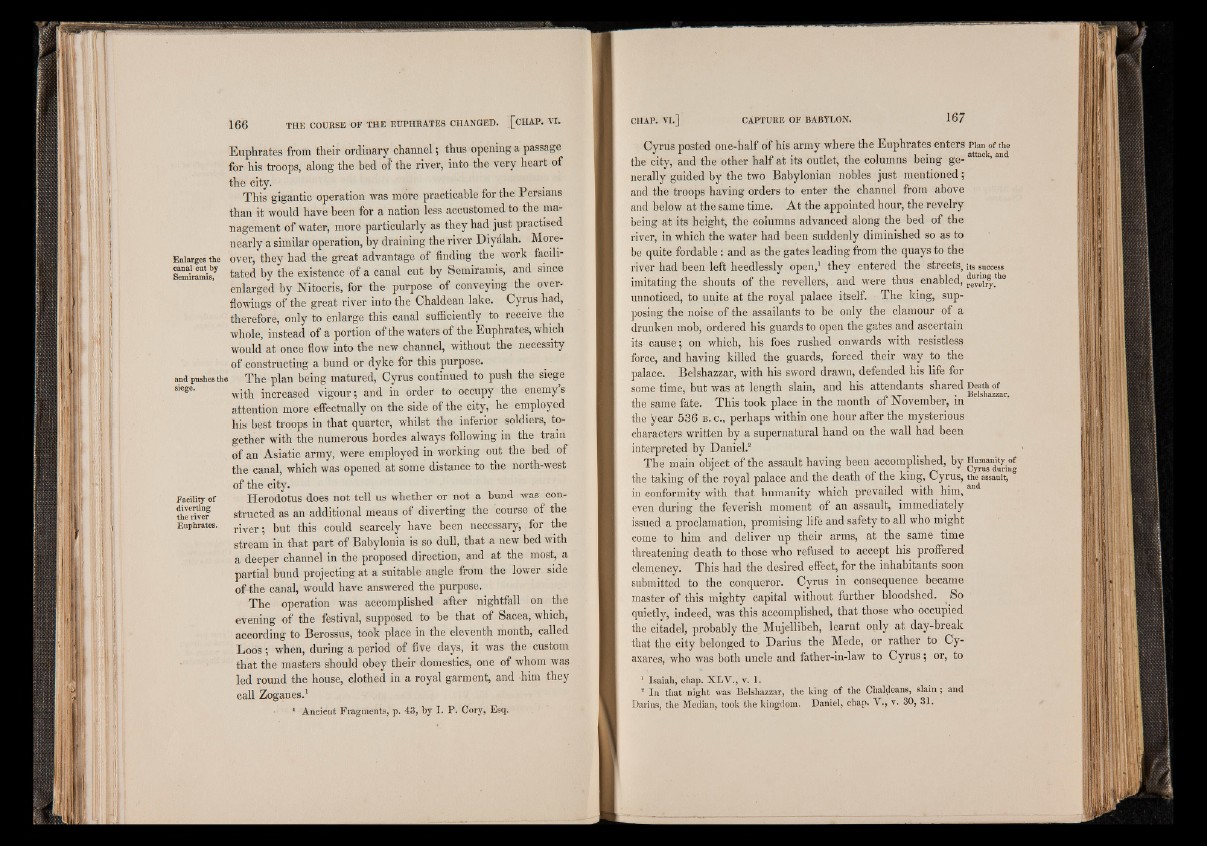
Enlarges tlie
canal cut by
Semiramis,
and pushes the
siege.
Facility of
diverting
the river
Euphrates.
Euphrates from their ordinary channel; thus opening a passage
for his troops, along the bed of the river, into the very heart of
the city.
This gigantic operation was more practicable for the Persians
than it would have been for a nation less accustomed to the management
of water, more particularly as they had just practised
nearly a similar operation, by draining the river Diyalah. Moreover,
they had the great advantage of finding the work facilitated
by the existence of a canal cut by Semiramis, and since
enlarged by Nitocris, for the purpose of conveying the overflowings
of the great river into the Chaldean lake. Cyrus had,
therefore, only to enlarge this canal sufficiently to receive the
whole, instead of a portion of the waters of the Euphrates, which
would at once flow into the new channel, without the necessity
of constructing a bund or dyke for this purpose.
The plan being matured, Cyrus continued to push the siege
with increased vigour; and in order to occupy the enemy’s
attention more effectually on the side of the city, he employed
his best troops in that quarter, whilst the inferior soldiers, together
with the numerous hordes always following in the train
of an Asiatic army, were employed in working out the bed of
the canal, which was opened at some distance to the north-west
of the city.
Herodotus does not tell us whether or not a bund was constructed
as an additional means of diverting the course of the
river; but this could scarcely have been necessary, for the
stream in that part of Babylonia is so dull, that a new bed with
a deeper channel in the proposed direction, and at the most, a
partial bund projecting at a suitable angle from the lower side
of the canal, would have answered the purpose.
The operation was accomplished after nightfall on the
evening of the festival, supposed to be that of Sacea, which,
according to Berossus, took place in the eleventh month, called
Loos; when, during a period of five days, it was the custom
that the masters should obey their domestics, one of whom was
led round the house, clothed in a royal garment, and -him they
call Zoganes.1
* Ancient Fragments, p. 43, by I. P . Gory, Esq.
Cyrus posted one-half of his army where the Euphrates enters Plan of the
the city, and the other half at its outlet, the columns being generally
guided by the two Babylonian nobles just mentioned ;
and the troops having orders to enter the channel from above
and below at the same time. At the appointed hour, the revelry
being at its height, the columns advanced along the bed of the
river, in which the water had been suddenly diminished so as to
be quite fordable: and as the gates leading from the quays to the
river had been left heedlessly open,1 they entered the streets, its success
imitating the shouts of the revellers, and were thus enabled, ^ ° ry.the
unnoticed, to unite at the royal palace itself. The king, supposing
the noise of the assailants to be only the clamour of a
drunken mob, ordered his guards to open the gates and ascertain
its cause; on which, his foes rushed onwards with resistless
force, and having killed the guards, forced their way to the
palace. Belshazzar, with his sword drawn, defended his life for
some time, but was at length slain, and his attendants shared
the same fate. This took place in the month of November, in
the year 536 b . c ., perhaps within one hour after the mysterious
characters written by a supernatural hand on the wall had been
interpreted by Daniel.2
The main object of the assault having been accomplished, by
the taking of the royal palace and the death of the king, Cyrus, the assault,
in conformity with that humanity which prevailed with him,
even during the feverish moment of an assault, immediately
issued a proclamation, promising life and safety to all who might
come to him and deliver up their arms, at the same time
threatening death to those who refused to accept his proffered
clemency. This had the desired effect, for the inhabitants soon
submitted to the conqueror. Cyrus in consequence became
master of this mighty capital without further bloodshed. So
quietly, indeed, was this accomplished, that those who occupied
the citadel, probably the Mujellibeh, learnt only at day-break
that the city belonged to Darius the Mede, or rather to Cy-
axares, who was both uncle and father-in-law to Cyrus; or, to
1 Isaiah, chap. X LV ., v. 1.
2 In that night was Belshazzar, the king of the Chaldeans, slain ; and
Darius, the Median, took the kingdom. Daniel, chap. V., v. 30, 31.